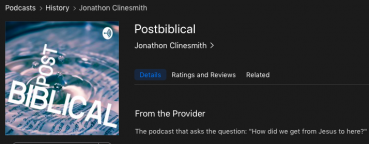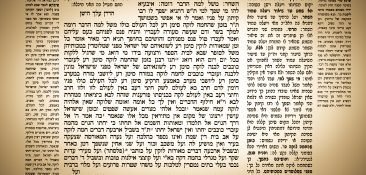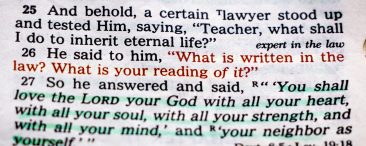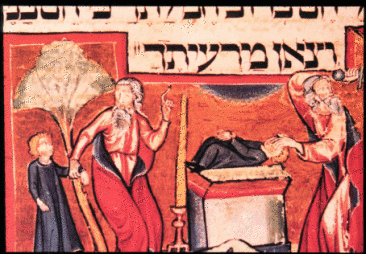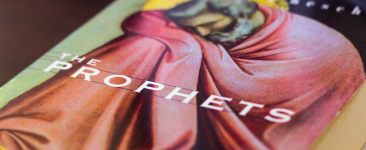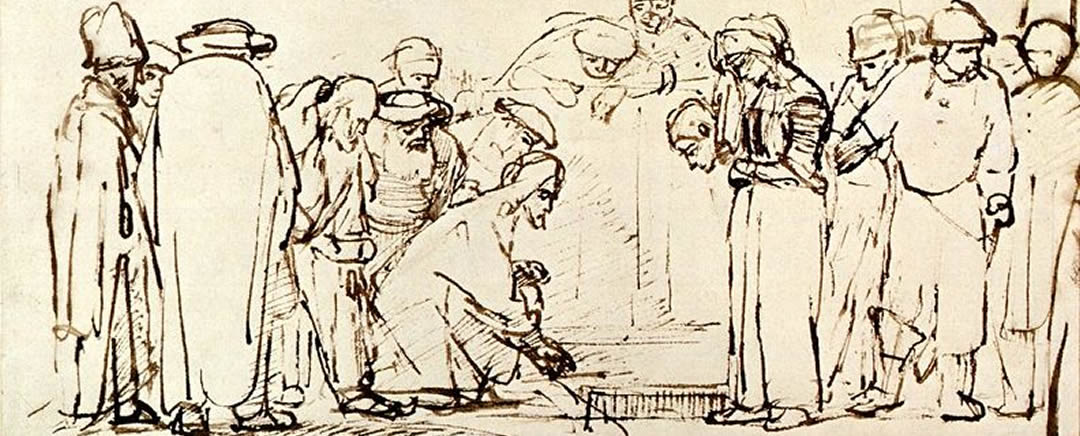My good friend, Ben Freeman, and I sat down again and recorded the second episode of the Out of Context podcast. Again, it was a blast (and, again, Ben did all the work).
Continue readingCategory Archives: Theology
The Out of Context Podcast
My good friend, Ben Freeman, and I sat down and recorded some of our conversations for a podcast. It was a blast (and Ben did all the work). In this first episode we cover a bit of our history and a wide range of topics, some of which are sparked by Ben’s question of whether dogs have souls.
PostBiblical Podcast
My friend Jonathon Clinesmith has started a new podcast called PostBiblical. I’m honored that he included me in the first three episodes dealing with a bit of the background and context for the life of Jesus and the New Testament.
The direct feed link for the podcast is here. Here are the links for iTunes or Spotify users.
The Talmud on Eclipses
Here is the only section I have found in the Babylonian Talmud which discuses eclipses (note that the phrase that is translated “lights are in eclipse” is literally comparable to “lights are stricken”): Continue reading
One of the Things I Love About The Bible
Most often there is no one “biblical position” on a topic, especially modern ones. Continue reading
Scot McKnight and Miraslov Volf on Twitter: Do Muslims, Jews, and Christians Worship the Same God
There is a fascinating discussion between the two theologians on twitter, sparked by Volf’s latest work, Allah: A Christian Response, in which he takes the position and Muslims and Christians worship the same God but have different understandings. Here are a few of the interchanges between the two of them on twitter (sparked by an initial tweet by Justin Taylor of McKnight’s comments):
Torah Reading, Week 4: “And He Appeared…”
This week’s Torah reading is Vayeira (וַיֵּרָ֤א—”And he appeared”) Genesis 18:1-22:24. It includes the promise that Sarah would have a son, Isaac or Yitzak—a boy named “laughter” because Sarah (who was 90 in the biblical narrative) laughed when she heard it. I suppose, in this regard, he could have easily been called named Yivkeh, “weeping”.
Getting Caught Up On Paul
There’s a lot going on with Pauline studies in the theological world (as if that’s anything new). It can really be difficult to keep up with in terms of reading. N.T. Wright’s latest work, Paul and the Faithfulness of God, has over 1700 pages! If you’re interested in a brief synopsis where things are concerning Pauline studies from Wright’s perspective, the attached video of Wright being interviewed by Michael J. Gorman is a good start. (Thanks to Kurt Willems for posting it).
The Prophets & an Emotional God
I recently began a re-reading of Abraham Heschel’s classic work, The Prophets, as part of personal research on the idea of “the weakness of God”. I first read Heschel as part of a undergrad class on the prophets of the Hebrew scriptures. The class was very small, consisting of only four or five of us. Through reading Heschel’s work and our personal, in-depth, and lengthy discussions, I was captivated and forever changed by the image of the prophet as one who wrestles with the “divine pathos”, the very suffering of God.
“Platitudes designed to make people feel better with bumper-sticker theology”—Nate Pyle
This post by Nate Pyle, “Confronting the Lie: God Will Not Give You More Than You Can Handle“, is so incredibly good. Please stop what you are doing and go read it right now. Here’s a snippet:
Not only am I okay asking those [difficult] questions, but I think there is something holy and sacred in being courageous enough to ask them. Don’t be fooled, those questions are only to be asked by the courageous. It is easy to spout trite Christian platitudes designed to make people feel better with bumper-sticker theology. But insipid axioms do little in the face of the actual brokenness of the world. It is more courageous to ask the hard questions of God and wait for him to answer than it is to find hope on the side of coffee mug. Asking those questions requires courage because, in the end, it is very likely they will not be answered.
Theological Discussions at the Doyle House
I came across this old post from 2008, and I enjoyed remembering it so much that I had to repost it. (Please note that my children are older, but the conversations haven’t necessarily changed that much.)
The following is from 2008:
So I walk into the living room and overhear the end of an apparently deep theological discussion among my daughters.
Hailey (9): “. . . God can do anything.”
Abby (5, thinks for a few seconds): “God can swim?”
Hailey: “Anything, Abby.”
Abby: “Even make cards?”
Hailey: “God can do anything.”
Eight
His finger cut through the sand and dirt. It wasn’t the first time he had seen his finger write in the the flesh of the earth. On the mountain he had written the words in the stone. He had given them to his people, those he had chosen to make his own. Words that were meant for life.
And this is what they had done with it. They had taken the very words meant for life and twisted them into an excuse to accuse and rain down death with stones, lists to decide who was right and who was wrong, who was in and who was out. His words, their lists.


